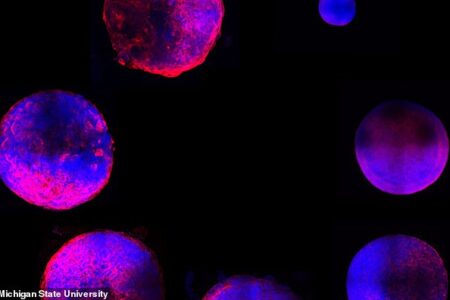Michigan State University researchers have created for the first time a miniature human heart model in the laboratory, complete with all primary heart cell types and a functioning structure of chambers and vascular tissue.
In the United States, heart disease is the No. 1 cause of death. “These minihearts constitute incredibly powerful models in which to study all kinds of cardiac disorders with a degree of precision unseen before,” said Aitor Aguirre, the study’s senior author and assistant professor of biomedical engineering at MSU’s Institute for Quantitative Health Science and Engineering.
This study, “Generation of Heart Organoids Modeling Early Human Cardiac Development Under Defined Conditions,” appears on the bioRxiv preprint server.
The human heart organoids, or hHOs for short, were created by way of a novel stem cell framework that mimics the embryonic and fetal developmental environments.
“Organoids—meaning ‘resembling an organ’—are self-assembling 3-D cell constructs that recapitulate organ properties and structure to a significant extent,” said Yonatan Israeli, a graduate student in the Aguirre Lab and first author of the study.
The innovation deploys a bioengineering process that uses induced pluripotent stem cells—adult cells from a patient to trigger embryonic-like heart development in a dish—generating a functional mini heart after a few weeks. The stem cells are obtained from consenting adults and therefore free of ethical concerns.
“This process allows the stem cells to develop,…



